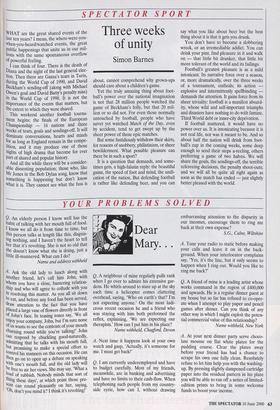SPECTATOR SPORT
Three weeks of unity
Simon Barnes
WHAT are the great shared events of the last ten years? I mean, the where-were-you- when-you-heard/watched events, the great public happenings that unite us in our mil- lions with the same spontaneous overflow of powerful feeling. I can think of four. There is the death of Diana and the night of the last general elec- tion. Then there are Gana's tears in Turin, during the World Cup of 1990, and David Beckham's sending-off (along with Michael Owen's goal and David Batty's penalty miss) in the World Cup of 1998. It is not the importance of the events that matters, but the extent to which they were shared. This weekend another football tourna- ment begins: the finals of the European Championship — 16 nations and three Weeks of tears, goals and sendings-off. It will dominate conversations, hearts and minds for as long as England remain in the compe- tition, and it may produce one of those nights of high drama that become for ever Part of shared and popular history. And all the while there will be a consider- able dissenting population; those who, like Mr Jones in the Bob Dylan song, know that something is happening but don't know what it is. They cannot see what the fuss is about, cannot comprehend why grown-ups should care about a children's game.
Yet the truly amazing thing about foot- ball's power over the national imagination is not that 28 million people watched the game of Beckham's folly, but that 20 mil- lion or so did not. For even those normally untouched by football, people who have never yet watched Match of the Day, even by accident, tend to get swept up by the sheer power of those epic matches.
But some fastidiously withdraw their skirts, for reasons of snobbery, philistinism, or sheer bewilderment. What possible pleasure can there be in such a sport?
It is a question that demands, and some- times gets, a high-falutin reply: the beautiful game, the speed of foot and mind, the unifi- cation of the nation. But defending football is rather like defending beer, and you can say what you like about beer but the best thing about it is that it gets you drunk.
You don't have to become a slobbering wreck, or an irremediable addict. You can drink your pint, find pleasure in it and walk on — that little bit drunker, that little bit more tolerant of the world and its failings.
Football's greatest pleasure is as a mild intoxicant. Its narrative force over a season, or, more dramatically, over the three weeks of a tournament, enthrals; its action explosive and intermittently spellbinding demands the attention. It gains force from its sheer triviality: football is a manifest absurd- ity, whose wild and self-important triumphs and disasters have nothing to do with famine, Third World debt or inner-city deprivation.
If football mattered, it would have no power over us. It is intoxicating because it is not real life, nor was it meant to be. And so about half the nation will drink from foot- ball's cup in the coming weeks, some deep enough to send their steps a-reeling, others preferring a game of two halves. We will share the goals, the sendings-off, the terrible refereeing decisions, the penalty shoot-outs; and we will all be quite all right again as soon as the match has ended — just slightly better pleased with the world.
































































 Previous page
Previous page